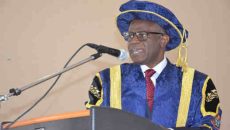The secret of the success of the telephone revolution in Nigeria is the federal government’s support for the commission and a robust national policy on ICT
 Eugene Juwah, executive vice chairman of Nigeria Communications Commission, NCC, revealed that the success of the liberalisation of the telecoms sector in Nigeria was due to the total support of the federal government. The Olusegun Obasanjo regime freed the sector from bureaucracy and public service bottlenecks and gave the board and management a free hand to run the commission according to international best practices. This brought the desired response from global businessmen to invest in Nigeria.
Eugene Juwah, executive vice chairman of Nigeria Communications Commission, NCC, revealed that the success of the liberalisation of the telecoms sector in Nigeria was due to the total support of the federal government. The Olusegun Obasanjo regime freed the sector from bureaucracy and public service bottlenecks and gave the board and management a free hand to run the commission according to international best practices. This brought the desired response from global businessmen to invest in Nigeria.
President Goodluck Jonathan continued in the same tradition of non-interference with NCC and provision of robust policy support for the growth of the sector. In addition, Jonathan removed telecommunications from the ministry of information and created a full ministry of communication technology to underscore the important government accords to information and communications technology, ICT.
Omobola Johnson, minister of communication technology, is overseeing the commission and making sure that government provides the necessary support to keep the revolution going and equally be abreast of the emerging trends globally.
In Jonathan’s transformation agenda, ICT is emphasised as “the foundation for Nigeria’s transformation.” The agenda leverages on ICT to catalyse national growth. According to Johnson, “The ICT industry is one of the fastest growing of the economy and ICT infrastructure is the foundation on which many economic services are delivered.” According to the World Bank, low income and middle-income countries experience “about 1.38 percentage increase in GDP for each 10 per cent increase in broadband penetration.”
Information and communications technology is playing a pivotal role in the National Development Agenda in four visible areas: governance, job creation, infrastructure and human and social capital development. In governance, government is deploying ICT to promote transparency and accountability; increase efficiency and interface with citizens, and streamline the provision of services and significantly reduce associated costs. In job creation, ICT has created new information and knowledge based economy. In the private sector, ICT is used to increase productivity and explore new markets. This creates more jobs in the economy.
Government is heavily investing in ICT infrastructure to ensure reliable connectivity. For instance, 40 per cent of NCC income is channelled to the Universal Service Provision Fund, USPF, to provide infrastructure in rural and remote areas where the service providers are reluctant to go because of the economics thereof. Government funds the infrastructure and allows the service providers to extend their services to the rural areas as part of its rural development agenda.
In human and social capital development, government is deploying ICT to facilitate research, improve medical care, accelerate knowledge acquisition and stimulate global knowledge networking. Telecoms alone contributes 10 per cent of Nigeria’s GDP; while the estimated size of the ICT job market is put at 4.8 million.
A comparison of the ICT industry between 2011 and 2014 showed a remarkable growth. In 2011, the industry was dominated by the telecoms sector and multinationals; in 2014, there is a lot of versatility and liberalisation. In 2011, ICT’s contribution to GDP was 5.46 per cent; in 2014 it climbed to 10 per cent. In 2011, there was a fragmented ICT industry with 350 small local companies; by 2015, government’s robust ICT policy has created big and strong local companies with global competence that are moving the country and business forward through innovation. In this league are: Wakanow, Jumia, Paga, Konga, iSEC, iROKO TV and others. Over $360 million was transferred out of Nigeria for procurement and maintenance of software for products and services; by 2014, government has lowered the entry requirements and increased the participation of Nigerian companies in the ICT business. Local competences are systemically emerging in software development.
The federal government is implementing the National Broadband Strategy and roadmap, which would increase broadband penetration from the present 6.1 per cent to 30 per cent in 2018. This policy would deliver 3G/LTE wireless broadband coverage to 80 per cent of the population; fixed wireless broadband to 16 per cent of population based on fibre by 2018; achieve a minimum download speed of 1.5Mps and have open non-discriminatory access.
The Smart States Initiative would significantly reduce the right-of-way fees, standardise states levies and taxes on ICT infrastructure and consolidate licensing through the “Dig Once/Pay Once” philosophy. Four states: Bayelsa, Cross River, Lagos and Ondo, and the Federal Capital Territory, FCT, are smart states; while Anambra, Delta, Gombe and Osun State have agreed to become smart states.
The government is also developing the appropriation legislations to secure ICT infrastructure in Nigeria. Two bills – Critical National Infrastructure Bill and Cybercrime Bill, have reached advanced stages in the National Assembly and may soon be passed into law.
With these many other policy initiatives, Jonathan’s government has taken the telecoms revolution to the next level.
Follow Us on Social Media


 WhatsApp us
WhatsApp us